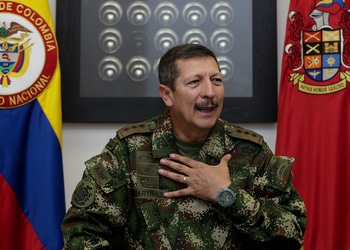New orders from Colombia’s military leadership showing a possible return to policies that previously led to a wave of extrajudicial killings has sown further discord when it comes to the future of the country’s peace agreement with the FARC.
An investigation by the New York Times revealed orders by top Colombian military commanders that called for an increase in captures and deaths of criminal elements, and a possible acceptance of higher civilian casualties. The order lessened the burden on military forces to engage enemy combatants, stating that “you must launch operations with 60 to 70 percent credibility or exactitude,” according to two officers interviewed by the newspaper.
The commander of the Colombian Army, Major General Nicacio Martínez Espinel, acknowledged that he gave the order and justified the measure by saying a new approach was needed due to the escalation of crime in the country.
The article sparked a prompt response from the government. The order was apparently modified a few days later, with President Iván Duque stating that there would be no tolerance for soldiers committing abuses. An internal investigation, however, was launched to discover who might have spoken with the New York Times.
SEE ALSO: Lessons for LatAm from Colombia’s Extrajudicial Killings
In February, Human Rights Watch (HRW) reported that at least nine generals in Duque’s military hierarchy, including Martínez Espinel, were under investigation for human rights abuses and extrajudicial killings that took place in units under their command from 2002 to 2008.
Known as ‘falsos positivos’ (false positives), soldiers killed young Colombian men, many of them poor or mentally handicapped, and disguised their bodies as guerrillas or registered them as enemy kills. It is estimated that up to 5,000 people were killed in this way.
InSight Crime Analysis
Despite the government walking back the dangerous orders, the mere existence of these orders are cause for real concern about how President Duque and his top general plan to attack irregular armed groups and other criminality.
A full accounting of the false positive killings has never occurred and several top military officials, including Martínez Espinel, have been implicated in the scandal. New Information came out recently that Martínez Espinel made payments to non-existent informants who claimed to have provided actionable information to the army in 2005. It appears two of these payments were made to a soldier who is currently serving a 40-year jail term for his role in extrajudicial executions.
Other serious accusations have fallen on retired colonel Óscar Gómez, a former commander of the 43rd infantry battalion in Vichada. On May 26, he was sentenced to over 37 years in jail for his alliance with former paramilitary leader Pedro Guerrero Castillo, alias Cuchillo, and for the murder of two civilians who were then passed off as guerrillas.
Colombia continues to face international reaction to the false positives scandal. US Congress members have written to Duque, asking him not to promote officers embroiled in false positives allegations. This includes Patrick Leahy, the ranking Democrat on the Congressional Appropriations Committee, which is tasked with authorizing funds for Colombia.
SEE ALSO: Coverage of FARC Peace Process
Finally, the recent murder of a demobilized Revolutionary Armed Forces of Colombia (Fuerzas Armadas Revolucionarias de Colombia – FARC) fighter by an active soldier in the department of Santander has only confirmed that the government is slowly returning to its old ways.
The murder was first reported as an accident but it was later confirmed the soldiers involved tried to cover it up. And, unsurprisingly, the general in charge of the area, Diego Luis Villegas, is also under investigation for his alleged role in extrajudicial killings.

